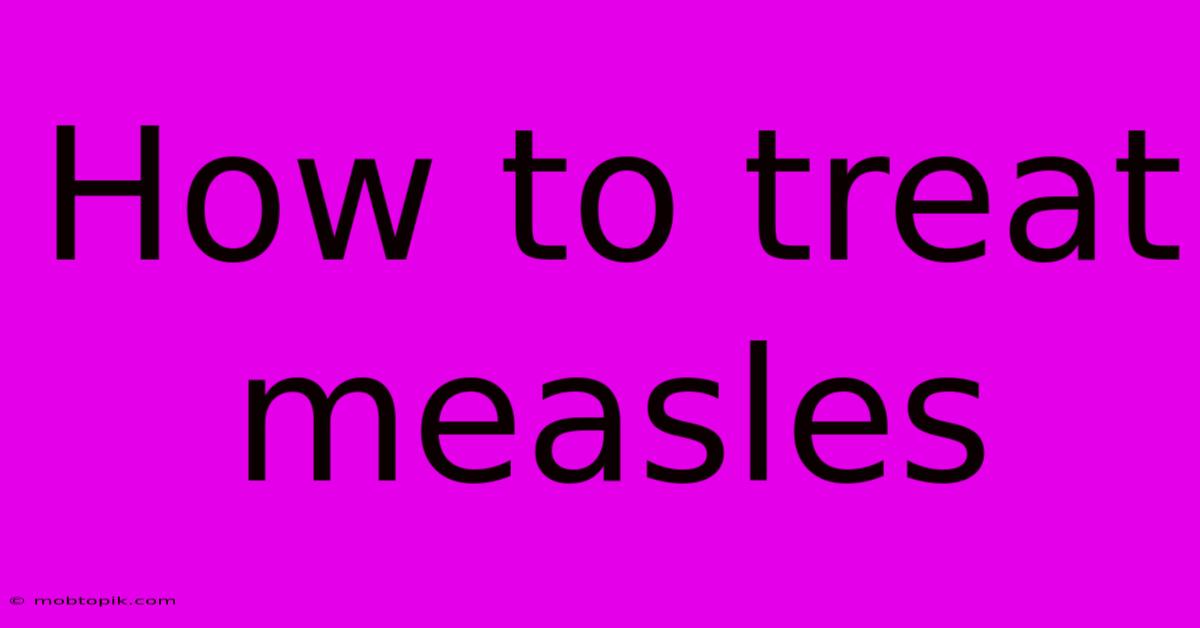How To Treat Measles

Discover more detailed and exciting information on our website. Click the link below to start your adventure: Visit Best Website mobtopik.com. Don't miss out!
Table of Contents
How to Treat Measles: A Comprehensive Guide
Measles, a highly contagious viral infection, is characterized by a distinctive rash, fever, cough, and runny nose. While there's no specific cure for measles, effective treatment focuses on managing symptoms and preventing complications. This comprehensive guide explores how to treat measles, emphasizing supportive care and highlighting when professional medical attention is crucial.
Understanding Measles and its Symptoms
Before delving into treatment, understanding measles is crucial. Caused by the measles virus (rubeola), it spreads easily through the air via coughing and sneezing. The incubation period (time between infection and symptom onset) is typically 7-14 days.
Classic Measles Symptoms:
- High Fever: Often exceeding 104°F (40°C), this is usually the first symptom.
- Cough: A persistent, dry cough is a common characteristic.
- Runny Nose: Often accompanied by sneezing.
- Conjunctivitis (Pink Eye): Inflammation of the conjunctiva (eye lining) causing red, watery eyes.
- Koplik's Spots: Tiny white spots inside the mouth, appearing on the inner lining of the cheeks. These are a hallmark sign of measles, though not always present.
- Maculopapular Rash: A characteristic red, flat rash that spreads from the head to the rest of the body. It often begins on the face and spreads downwards.
Serious Complications:
While many individuals recover fully, measles can lead to severe complications, especially in young children, pregnant women, and individuals with weakened immune systems. These include:
- Pneumonia: Lung infection.
- Encephalitis: Inflammation of the brain.
- Ear Infections (Otitis Media): Infection of the middle ear.
- Diarrhea: Leading to dehydration.
- Death: In rare cases, measles can be fatal.
Treatment Strategies for Measles
Treatment for measles focuses primarily on alleviating symptoms and preventing complications. There is no antiviral medication specifically designed to treat the measles virus. The focus is on supportive care.
1. Supportive Care at Home:
This forms the cornerstone of measles treatment:
- Rest: Ample rest is crucial for the body to fight the virus. Encourage the patient to stay home from school or work.
- Hydration: Maintaining proper hydration is essential, especially given the potential for fever and diarrhea. Offer plenty of fluids such as water, clear broths, and electrolyte solutions (like Pedialyte). Avoid sugary drinks.
- Fever Management: Use acetaminophen (Tylenol) or ibuprofen (Advil, Motrin) to reduce fever and alleviate discomfort. Never give aspirin to children or teenagers due to the risk of Reye's syndrome. Follow the recommended dosage carefully.
- Cough Suppressants: Over-the-counter cough suppressants may help manage a persistent cough, but always consult a doctor before administering medication to children.
- Humidifier: A cool-mist humidifier can help soothe irritated airways and alleviate cough.
- Eye Care: For conjunctivitis, cool compresses can help soothe inflamed eyes. Avoid rubbing the eyes to prevent further irritation and infection.
2. When to Seek Medical Attention:
While many cases of measles resolve with supportive care, it's crucial to seek immediate medical attention if:
- High Fever: A fever that persists despite fever-reducing medication or reaches dangerously high levels.
- Difficulty Breathing: Shortness of breath, rapid breathing, or wheezing.
- Dehydration: Signs of dehydration include decreased urination, dry mouth, sunken eyes, and lethargy.
- Seizures: Any occurrence of seizures necessitates immediate medical care.
- Severe Cough: A persistent, severe cough that interferes with breathing or sleep.
- Signs of Pneumonia: Cough accompanied by chest pain, rapid breathing, or bluish discoloration of the skin (cyanosis).
- Earache: Persistent ear pain.
- Lethargy and Unresponsiveness: Significant changes in alertness or responsiveness.
- Pregnancy: Pregnant women with measles require close medical monitoring due to the potential risk to the developing fetus.
3. Hospitalization:
Hospitalization might be necessary for individuals experiencing severe complications like pneumonia, encephalitis, or dehydration. In the hospital, patients receive intravenous fluids, oxygen therapy, and other supportive treatments as needed.
Preventing Measles: Vaccination is Key
The most effective way to prevent measles is through vaccination. The MMR (measles, mumps, and rubella) vaccine is highly effective and safe. Two doses are generally recommended for optimal protection. Vaccination not only protects individuals but also contributes to herd immunity, protecting those who cannot be vaccinated.
Vaccination Schedule:
- First Dose: Typically given between 12 and 15 months of age.
- Second Dose: Given between 4 and 6 years of age.
Consult your doctor for personalized vaccination advice. They can help determine if you are up-to-date on your MMR vaccinations and discuss any concerns you may have.
Conclusion
While there's no cure for measles, effective supportive care and prompt medical attention for complications can significantly improve outcomes. Remember that the cornerstone of measles prevention is vaccination. If you suspect you or someone you know has measles, seek medical attention immediately. Early diagnosis and appropriate management are key to minimizing the risk of serious complications and ensuring a full recovery. This information is for general knowledge and should not replace professional medical advice. Always consult your healthcare provider for diagnosis and treatment.

Thank you for visiting our website wich cover about How To Treat Measles. We hope the information provided has been useful to you. Feel free to contact us if you have any questions or need further assistance. See you next time and dont miss to bookmark.
Also read the following articles
| Article Title | Date |
|---|---|
| 1 4 Rangers Avrupa Ligi Nde Zafer | Nov 29, 2024 |
| How To Treat Eczema | Nov 29, 2024 |
| How To Treat Depression | Nov 29, 2024 |
| How To Treat Headaches | Nov 29, 2024 |
| How To Treat Cuts | Nov 29, 2024 |
